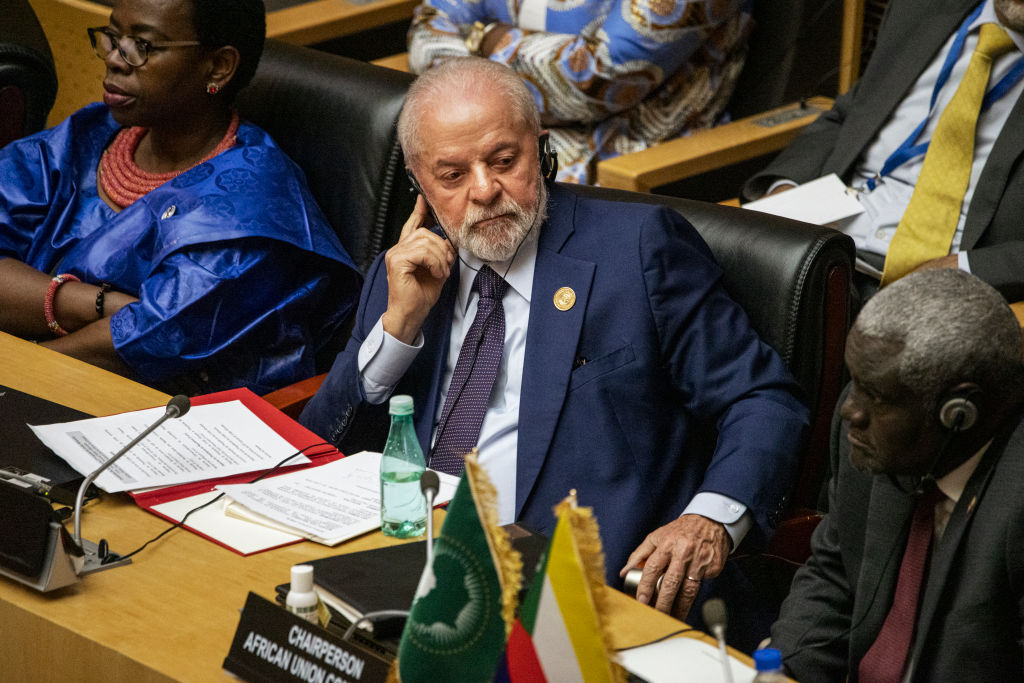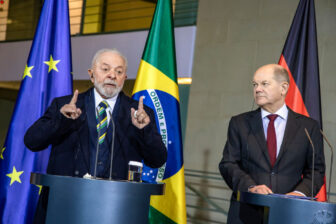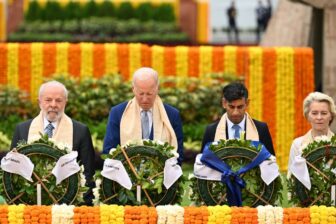RIO DE JANEIRO—To paraphrase the famous quote by Prussian general Carl von Clausewitz, you could say that foreign policy in the 21st century is the continuation of domestic politics by other means.
It’s impossible to truly understand the controversy that played out last week between Brazil’s President Luiz Inácio Lula da Silva and the government of Israel without understanding its internal effects, in both nations.
Thanks to the immediacy that social media provides, nowadays international trips, photos with foreign leaders and opinions on other countries’ affairs have become instruments for domestic policy. Take one of Lula’s trademarks during his first year back in office: receptions for foreign leaders aimed to reinforce the claim that “Brazil is back,” after becoming an international pariah under Jair Bolsonaro. The former president’s supporters supporters, on the other hand, point to distance between Lula, the U.S., and Europe to support their argument that, under Lula, Brazil would become a puppet state at the service of autocrats like Xi Jinping and Vladimir Putin.
It was against this background that on February 18, Lula responded to a question during an interview at the close of the African Union Summit in Addis Ababa, Ethiopia, about Brazil’s relief package for the UN refugee assistance agency UNRWA, after the Israeli government raised concerns about some agency employees’ supposed ties to Hamas. Here is Lula’s response:
“Brazil did not only pledge to contribute. … Brazil also committed to advocate for a definitive and full recognition of a sovereign Palestinian state at the UN. It’s also important to remember that Brazil was the first country to officially recognize the Palestinian state back in 2010. We must stop acting small when the situation requires us to be greater. What’s happening in Gaza with the Palestinian people right now has never happened before in the history of humankind. Actually, it did happen before: when Hitler decided to slaughter the Jews”.
Lula’s remark could be taken as proof of Godwin’s Law, a satirical dictum by an American lawyer that predicts that as a discussion drags on, the chances of someone making the comparison to Adolf Hitler or the Nazis tends towards 100%. In fact, the comparison between Israel’s military action in Gaza and Nazi Germany was historically inaccurate, diplomatically hollow, offensive to the victims of the Holocaust, and politically disastrous.
Although Brazil has basically no relevance in the Middle East diplomatic arena, Benjamin Netanyahu’s government capitalized on Lula’s statement for the purposes of domestic politics, reinforcing its strategy, as two Brazilian writers recently put it, of arguing that “Israel is surrounded both by real enemies, such as Hamas, and imaginary ones, such as the millions of innocent civilians in Gaza, in order to oppose the creation of a Palestinian state.”
In a matter of days, the Israeli government had declared Lula persona non grata in the country, humiliating the Brazilian ambassador in Tel Aviv and putting the stamp of trivializing the Holocaust on Lula. Internally, Netanyahu scored ample points.
Consequences in Brazil
Meanwhile, there were repercussions in Brazil’s domestic politics. On February 25, a pro-Bolsonaro rally in São Paulo that had been planned as a demonstration of solidarity with the former president—who is under investigation for an alleged coup plot (Bolsonaro denies the allegations)—became a protest against Lula’s alleged anti-Semitism. Among the thousands of the green and yellow Brazilian soccer jerseys in the march, there were also hundreds of Israeli flags.
Posting a picture of the rally, Israeli foreign minister Israel Katz wrote on X, formerly Twitter: “Thank you, Brazilians, for your support of Israel. Not even Lula can divide us.”
For the many of Brazil’s 40 million Brazilian evangelicals for whom relations with Israel have deep religious significance, Lula’s remark reinforced decades-long fears and prejudices—and risked throwing out the window the government’s careful efforts to build bridges with evangelicals. Still, Lula’s statement was reinforced by PT loyalists on social media.
The government’s reaction
Meanwhile, Lula’s administration seemed overtaken by events. The first public interview on the subject, by Foreign Affairs Special Advisor and former foreign minister Celso Amorim, made matters worse, with Amorim claiming that “Israel is the one that needs to apologize, not Lula.”
Only on February 19, more than 24 hours after the initial comment, did the government put its best foot forward, when Institutional Relations Minister Alexandre Padilha said that Lula’s protest was against Netanyahu and his cabinet, not Israel and the Jewish people. But the damage was already done.
On February 23, Lula maintained a bellicose tone, opting not to apologize or change tone. “Don’t try to interpret the interview I gave in Ethiopia,” he said. “What is happening in Israel is a genocide. Thousands of children have died, thousands have disappeared. It’s not soldiers that are dying, but women and children inside hospitals. If that’s not genocide, I don’t know what is.”
There is a famous witticism from a former Brazilian house speaker, Ulysses Guimarães (1916-1992), who said that “diplomacy only wins votes in Burundi,” referring to the tiny country in Central Africa. The thrust of the remark is that foreign policy doesn’t decide anyone’s vote. But that isn’t quite the case anymore. A leitmotif of Bolsonaro’s administration was portraying the Foro de São Paulo, Latin America’s club of left-wing parties, as a gang of terrorists and drug traffickers following the direction of Chavismo. In 2022, every time Bolsonaro wanted to say that Lula would bring chaos to Brazil, he said he would “turn the country into Venezuela”—and most people did understand where he was coming from.
Lula’s remarks on Hitler were the third-most discussed topic on Brazilian social media since 2023, losing only to the January 8, 2022 coup attempt and the Federal Police operation targeting Bolsonaro, according to a survey put out by Quaest.
The news cycle will move on, but that won’t diminish the gravity of Lula’s political blunder. With his unfortunate comparison, Lula has thrown gasoline into the fire of polarization, encouraging his supporters to circle their wagons around him, while providing Bolsonaro and his own supporters room to breathe. Lula risks making the same mistake as Bolsonaro: talking only to his core constituency, alienating voters in the political center. While they are a small minority—almost as small as Burundi, you might say—voters in this political and ideological center effectively decided both of the last two presidential elections. And in an ever more divided nation, this “Burundi” could decide the next election, too.
—
Traumann is a journalist and independent consultant. He is the author of O Pior Emprego do Mundo (“The Worst Job in the World”), a book about Brazilian finance ministers.









